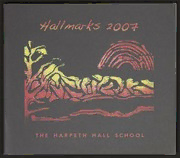Table Of ContentTHE HARPETH HALL SCHOOL
Literature, Ard, and Song
Jrom the Upper School student body of
The Harpeth Hall School
3801 Hobbs Road *Nashville, TN37215
www.harpethhall.org
Cover image by Jane Marie Brown
"Still Warm From the Day” title by Grace wright
Literary Contents
“On Poetry” by Becca Hill 6
“Bibliophile” by Grace Wright ¢ 11
“Forgetfulness” byJasmine Miller 12
“Know” by Becca Hill « 18
“Museum Dolor” by Suzanne Lewis © 21
“How It Starts” by Carolyn Murdock 23
“A Night” byJasmine Miller 24
“The Moon Is Thought Suspended” by Becca Hill 26
“Breaths” by Grace Wright * 29
“July” by Kara Earthman ¢ 30
“Pool of Determination” by Maggie Wilkins ¢ 32
“Misenus” by Molly Robert ¢ 34
“Watermelon” by Alex Guillen 37
“Something like Home” by Mary Tek 39
“Gunpowder and Sand” by Emily Tseng 40
“Goodbye” by Becca Hill 42
— original songs —
“No Words” by Kristin LeRoy /Joe Croker
“Dear Child” by Lisa Carson /Joe Croker
“Hello” by Claudia Crook”
“I Remember” by Olivia Burd
T//westrations
“Oblivion” byJane Marie Brown © cover
“Class” by Mary Fowler Howell © 7
“Fire” by Elizabeth Counihan ¢ 9
“Jump” by Carell Palmer 10
“Dark Park” by Rachel Styers * 13
“Trees” byJulia Liang * 14
“Bare Limbs” by Ashley Hayden ¢ 16
“Rear Window” byJanieJackson ¢ 17
“Girl Praying” byJeuneJo ¢ 19
“Cat” by Arianna Burkhardt * 20
“Cleopatra” by Octavia Obolensky 21
“Marilyn” by Margaret Roberts 22
“Enlightenment” by Megan Wilson ¢ 25
“Mirror Image” by Eleanor Ezell « 27
“Water Hand” by Liz Fletcher » 28
“Chicago Sun” by Blair Carter ¢ 30
“Summer Scenes” by Taylor Fettroll 31
“Whoosh” by Lauren Riegle 33
“Seascape” by Lauren Riegle * 35
“Water Clock” by Ashley Hayden © 36
“Saxophonist in the Snow” by Sally Anne Harrell 38
“One Tunnel with Many Exits” by Sydney Cannon © 41
“Mary on the Tracks” by Emi Mimms ¢ 43
“Guitarist” by Caroline Mack 45
“Eric Volz” by Claire Moll * back cover
On Poelry
Becca Hill
AssoonasFredgetsoutofbed
His underweargoesonhishead
Hismotherlaughs, “Don’tputitthere,
Ahead’snoplaceforunderwear!”
Butnearhisears, abovehisbrains
IswhereFred’s underwearremains.
AtnightwhenFredgoesbacktobed
Hedeftlyplucksitoffhishead
Hismotherswitchesoffthelight
Andsoftlycroons, “Goodnight,goodnight2»
Andthen,forreasonsnooneknows,
Fred's underweargoesonhis toes.
Thatwasthe firstpoem I ever memorized. You’d be hard-pressed to find an ounce of symbolic imageryin
those twelve lines of AA BB CC nonsense, but they tell this imaginary (or maybe real) story without being
obvious. The poetfits it into iambic pentameter and rhyme thatyou couldjump ropeto.
My admiration for poetry was probably founded on my dad’s romanticism. Night-time poetry readings
were not an anomaly in the Hill household, especially when I became old enough to progress from Shel
Silverstein to Robert Frost and Emily Dickinson. I'm not sure why my dad thought I would understand
e.e. cummings when I was elevenyears old, but afterhearingexcerpts from the decrepit anthologymy dad
has had for years, strange phrases wouldn’t stop swimming around in my mind. Phrases like “evil is so
worse than worst you fall in hate with love” and “the voice ofyour eyes is deeper than all roses”
and “love’s the Iguess most only verb that lives” and “your life is only like one star after
rain.” Prose contains no such clifthangers.
Poetry looks at things through painted magnifying glasses, making
everything bigger and more extraordinary than reality permits.
=
It lends alternative definitions to innate assumptions. What is fog? Robert Frost and T.S. Eliot tell us it’s
a cat, slithering unnoticed between the buildings of London or walking carefully with her padded paws
alongthe docks by night. Whatis death? cummings saysit’s no parenthesis. Ourblood is an ocean,trees
are gossipy women, the evening sky is a gassed patient, and the moon is “a fragment ofangrycandy.”
| I am not sure exactlywhat it is about the inversion of syntax and imagery and personification that makes
peoplehearstatementsinadifferentwaythantheywouldotherwise, butthere are alotofthingsIwouldn’t
appreciate or even recognize if itwasn’tforpoetry. Lookingatthe Christian bible, there are parts that are
more prosaic than others, but the phrase “love thy neighbor as thyself” never really struck a chord with
me as much as this Emily Dickinson poem:
Mary FowlerHowell
Ihadno time tohate
because thegrave wouldhinderme.
andlife wasnotso ample
Icouldfinish enmity.
NorhadItime tolove
Butsincesomeindustrymustbe
Thelittle toiloflove, Ithought,
waslarge enough forme.
Not only does poetry change my emotions startlingly easily, but it also tends to make me feel supported.
It is rare to have a mood that a poem can’t understand. Out of the centuries of poets of different back-
ground, religion, time period, and sexual orientation, the mathematical odds are almost impossible that
there couldbe no one else who has felt chagrin atthe loss of aloved one orthe ignorance of afriend orthe
stupidity of an authority figure. Poetry convinces us that our angst is not only natural—it is beautiful.
There is something consoling and exciting about Emily Dickinson saying to me, “I’m nobody! Who are
you?Areyou nobody, too? Then there’sapairofus —don’t tell!”orin Mary Oliverasking, “Anddidyou
feel it, in yourheart, howitpertained to everything? Andhave you too finallyfigured out what beautyis
for? Andhave you changedyourlife?” An afternoon of curling up with the poetry of these women who
seem so selfless, and it’s hard not to feel included and understood. I'm almost mad at myself (but not at
all surprised) for not being able to describe the beginnings of relationships half as well as e.e. cummings
when he says, “Once like a spark, when strangers meetlife begins.”
I don’t think I’ve ever come across something that could manipulate my emotions quite so easily as a
poem. And for this reason, it is important to look at things as a poet might. Creating images,
personifying objects, and reversing the order of simple words makes everything look,
sound, and feel more vital. With poems that uproot and reconstruct almost every
little thing we encounter on a daily basis (such as leaves and roads and sleep
and clouds), it is impossible to run out of reasons to be happy ... and
that’s the best emotion to feel.
Elizabeth Counthan
Carell Palmer

